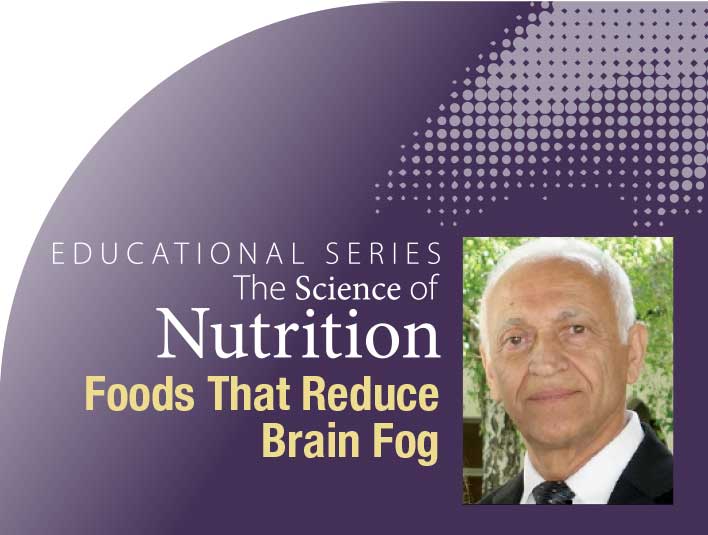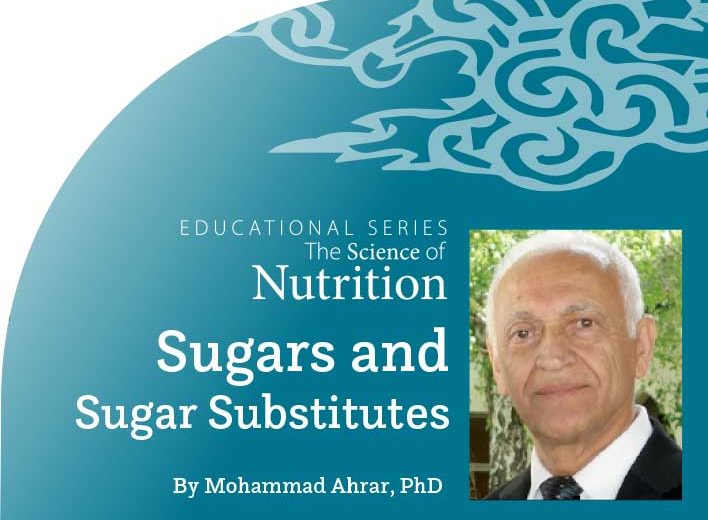Educational Series
The Science of Nutrition
Foods That Reduce Brain Fog
By Mohammad Ahrar, PhD
Introduction
The brain is the most complex organ in the body. It consists of billions of special cells, called neurons, which are interconnected like a complex network. Each neuron may have thousands of connections to other neurons to control the internal environment and respond to stimuli from the environment. Therefore, the brain needs a constant supply of oxygen and nutrients to function properly. In this article, we will review the benefits of some foods that help brain cells stay healthy.

General structure of the brain
The brain is basically made of neurons and supportive cells known as neuroglia or glial cells.
Neurons are the structural and functional units of the nervous system. It is estimated that the human brain contains about 100 billion neurons and four times as many supportive cells. Neurons live and function for a lifetime. They do not divide or replicate. Neurons have a very high metabolic rate and high demand for oxygen and glucose to produce energy to run chemical reactions. It is believed that each neuron performs 10,000 chemical reactions per second and continuously generates electrical signals and secretes neurotransmitters to communicate with other neurons and with other cells in the body.
The neuroglia or glial cells have different roles in the nervous system. Their function is to support neurons, like bodyguards. They provide structural support, isolate, protect, nourish, and maintain the intercellular environment. One type of glial cells separates neurons from direct contact with blood capillaries that may contain toxins and provides a so-called “blood–brain barrier.” Some other types of glial cells work like immune cells and destroy invading pathogens. Still others produce myelin sheaths, a fatty layer that wraps around the axons of neurons for a faster nerve impulse.
What factors affect neurons that may cause a “foggy brain”?
Generally, any factor that interferes with the metabolic functions of neurons or disrupts the communication between neurons can affect normal brain functions, including memory problems, poor concentration, or the inability to focus, which are some symptoms of a foggy brain. Although brain fog is not considered a medical condition, it can be a symptom of other serious issues. Poor nutrition can be one of them. Other factors that can cause brain fog may include lack of sleep, certain medications, heavy metals, inflammation, dehydration, and bacterial or viral infections.
What do brain cells need most?
Oxygen – Brain cells are most sensitive to oxygen levels in the blood and cannot survive more than a few minutes without oxygen. Therefore, neurons must have a constant supply of oxygen. Any abnormality with the respiratory system and cardiovascular system can influence the blood supply to the brain.
Energy – Neurons need a tremendous amount of energy to function. The energy that cells use is the chemical energy referred to as adenosine triphosphate (ATP), which is essential for chemical reactions in cells. Neurons use simple sugars and fats as the main source of energy for metabolic reactions.
Water – Most chemical reactions in cells occur in the presence of water. Because the brain continuously processes chemical reactions, it needs to be hydrated. Not drinking enough water can result in brain fog.
What other nutrients do brain cells need?
Carbohydrates – Glucose is the primary source of energy for brain cells. The brain cannot store glucose. Therefore, it must have an uninterrupted and constant supply of glucose to provide energy for the nerve cells to function. Too high or too low a blood glucose level is harmful to the brain. Therefore, it is critical to maintain blood glucose levels in a normal range. People whose blood sugar is on the high end of the “normal range” have a higher risk for brain shrinkage, which causes brain disorders and dementia. Even people without diabetes who have high blood sugar tend to perform worse in memory tests and may have a shrunken hippocampus (part of the brain involved in learning). For information about carbohydrates, please visit Peyk #163.
Fats – Fats are an integral part of brain cells; the cell membrane is made of mainly phospholipids, sphingolipids, and other types of fats, including cholesterol. Most neuron axons (the long extension of the neurons) are covered by a fat-based myelin sheath, which is responsible for fast nerve impulse transmission. Although fats are essential nutrients for brain cells, the brain is very picky about the type of fat it needs. The brain can use different types of fats and even fat metabolites, such as ketones. Studies have shown that fats that contain essential fatty acids, such as omega-3 fatty acids, are preferred fats for brain function.
Studies indicate that a decrease in the omega-3 fatty acid in the brain is associated with cognitive decline during aging and with the onset of sporadic brain disorders. Studies also indicate that omega-3 fatty acids may activate the genes that produce new neurons in the hippocampus of the brain (the memory area of the brain), improving memory and preventing Alzheimer’s disease. (1) Fish oil, flax seeds, nuts, egg yolk, mother’s milk, and cold-water fish such as salmon, herring, mackerel, tuna, anchovies, and sardines are good sources of omega-3 fatty acids. Fish is also a good source of vitamin D and vitamin E, which protect the brain from declining mental skills and memory loss. More information about omega-3 fatty acid is discussed in Peyk #160.
Besides omega-3 fatty acids, foods that contain unsaturated fatty acids are good for brain health. Olive oil is rich in monounsaturated fatty acids and has been shown to improve overall cognitive function as well as verbal memory in the study groups. For more information about fats, please visit Peyk #159.
Proteins – Proteins are components of the brain cell membrane. The enzymes inside the cells that run the chemical reactions and produce energy are proteins. Most neurotransmitters. such as serotonin and dopamine, are made of amino acids which are subunits of proteins. The amino acid glutamate plays a crucial role in the rapid signaling between brain cells. Meat, poultry, fish, and eggs are excellent sources of protein. Beans, nuts, and seeds are also good sources of plant proteins. More information about proteins was discussed in Peyk #162.
Vitamins – Vitamins are essential for healthy brain function. B vitamins, especially folate, vitamin B12, and B6, work as coenzymes and play a major role in cellular metabolism and energy production in the brain cells. B vitamins (except B12) are found in fruits, vegetables, and seeds. Vitamin B12 is found only in animal products such as eggs, poultry, and meat. (See Peyk #174 for more information about B vitamins.)
Vitamins C and E are known for their high antioxidant activity and their role in the deactivation of free radicals that can disrupt and damage the normal chemical reactions in brain cells. Studies have suggested cellular damage caused by free radicals may be linked to a range of disorders, including cardiovascular disease, Parkinson’s disease, and Alzheimer’s disease.
Foods that contain antioxidants have been shown to support brain health, which could translate into better mental function and reduce foggy brain. Berries, broccoli, cauliflower, brussels sprouts, cabbage, and kale are rich in antioxidants which are linked to lower odds of getting dementia later in life. Citrus fruits, tomatoes, pomegranates, and red or green peppers are also good sources of antioxidants. Most berries contain flavonoids, such as anthocyanin, and carotenoids, as well as vitamins E and B, vitamins that reduce inflammation and prevent oxidative stress in the cells. Nuts such as walnuts, almonds, and hazelnuts contain omega-3 fatty acids, as well as vitamin E which has antioxidant properties. Foods such as carrots, red grapes, tomatoes, and most berries are good sources of carotenoids, lutein, resveratrol, lycopene, and other phytochemicals that are potent antioxidants.
What other factors reduce brain fog?
Health professionals suggest that the number one thing you can do to improve brain health is physical activity. Exercise may activate certain genes in brain cells that control brain function, regardless of age. The reason is that connections or synapses between neurons can get stronger through physical activities and mental challenges. Any exercise that makes your heart beat faster will increase blood flow to the brain and the neurons can get enough oxygen, which helps reduce brain fog.
What foods can harm the brain?
Excess sugar, sugary drinks, fructose corn syrup, artificial sweeteners (such as aspartame), and processed white flour (when eaten in excess) can adversely affect brain function and may result in brain fog. Foods that contain saturated fats and foods cooked in high-temperature boiling oil, such as fried foods, can cause inflammation; therefore, they are not friendly to brain tissues. Oils that contain a high proportion of omega-6 fatty acids, such as soybean oil, can cause inflammation. Alcohol, tobacco smoke, pesticides, heavy metals such as mercury, certain drugs, industrial solvents, and air pollutants are among the substances that produce free radicals which can result in a decline in cognitive function and brain fog.
Summary
The brain needs a constant supply of oxygen and energy to function. The brain cells (neurons) are very sensitive to oxidative stress and harmful chemicals. Foods that contain antioxidants and omega-3 fatty acids are known to support brain health, which could translate into better mental function and reduce brain fog.
Selected References:
1- Grain Brain, David Perlmutter, Little, Brown and Company, New York (2013).
2-https://www.health.harvard.edu/mind-and-mood/foods-linked-to-better-brainpower
3- https://www.hopkinsmedicine.org/health/wellness-and-prevention
4- https://www.webmd.com/diet/features/eat-smart-healthier-brain#1
5- The Brain Fog Fix, Mike Dow, MD, Hay House, Inc., Carlsbad, California (2015).
6-https://www.health.harvard.edu/mind-and-mood/foods-linked-to-better-brainpower
7- https://www.medicalnewstoday.com/articles/324044
8- https://www.everydayhealth.com/emotional-health/brain-fog/guide/

















